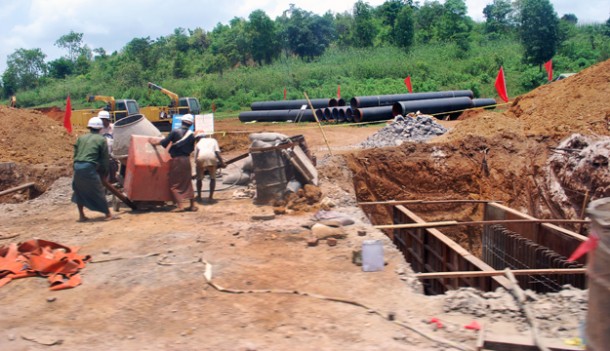An alliance of 12 civil society groups in Burma have called for the suspension of the Shwe Gas pipelines until the project has been properly assessed and the existing problems have been solved.
In its Oct. 1 statement, the alliance, known as Myanmar-China Pipeline Watch Committee, called on the Burmese government to ensure transparency in the project’s affairs, and for environmental and social impact assessments to be conducted before the remaining 20 percent of the construction is completed.
Tin Thit, a spokesman for the Myanmar-China Pipeline Watch Committee, told The Irrawaddy on Wednesday that “there needs to be a solution to the environmental and social problems. Therefore, we urge the authorities to suspend the project until these issues are solved.
“Double the amount of land has been used to accommodate the pipelines than the contractors promised the land owners who, in turn, have received less compensation than they should expect,” he said.
The Shwe Gas project is a joint venture between China National Petroleum Corporation and Myanmar Oil & Gas Enterprise (MOGE), who are contracted to build gas and oil pipelines through Burma from the western coast of Arakan State to China’s southwest Yunnan Province. The oil and gas pipelines pass through 21 townships as they span 800 km (500 miles) across Burma.
Environmental activists claim that locals have lost their farmlands and crops, public lakes and other sources of drinking water, religious grounds, watershed areas, forests, flora and fauna, marine life and coral reefs due to the pipeline construction.
Many roads have also been uprooted, Tin Thit said.
The NGO alliance said that local ethnic people are not entitled to participate in the project’s implementation meetings, and that their rights are not being respected.
“The public are uninformed about the terms of the contract, the safety regulations, the finance information and the sustainability plans for the future,” said Aung Kyaw Soe from the Thazin Development Foundation, which has conducted research into the project’s impact on local residents and the environment.
The Myanmar-China Pipeline Watch Committee also highlighted in its statement human rights violations and a lack of transparency by MOGE in failing to inform the public about its management plans.
The remaining 20 percent of the pipeline within Burma which has yet to be constructed involves two areas: the highlands of northern Shan State, which is controlled by Kachin rebels fighting government forces; and the Arakan Roma mountain range. Construction on the pipelines in these areas is due to recommence after the rainy season.
The pipelines, which are scheduled to be completed by May 2013 and are expected to start transporting gas and oil by September of the same year, will each earn Burma US $7 million a year in right-of-way transit fees, and will cost $2 billion each to build, according to the Ministry of Energy’s Energy Planning Department.

















